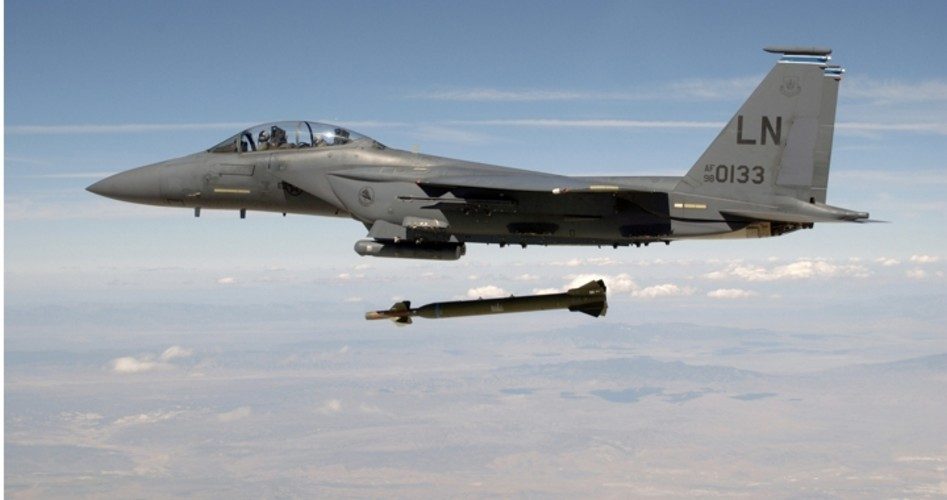
Senator Tim Kaine (D-Va.) has called for a congressional vote on U.S. military strikes against the Islamic State of Iraq and the Levant (ISIL), and that has fellow Democrats worried about raising war issues weeks before this year’s elections, the Washington paper, The Hill reported Wednesday.
“Asking anybody to take that vote within two months of an election is just stupid. Why would you put people in that position?” was a comment The Hill quoted from to an unnamed Democratic senate aide. Some worry that a renewed focus on President Obama as commander in chief could be bad news for vulnerable Democratic candidates at a time when the nation is war weary and the president’s approval ratings are tanking.
“I think it’s dumb,” another Democratic aide told The Hill. “The less the president is in the news with anything right now, the better.” Kaine, 56, is a former governor of Virginia who won election to the senate in 2012. Assuming he remains in the seat and does not seek another office during his six-year term, the freshman senator will not have to face the voters again until 2018. He nonetheless contends that concerns about the political fallout from a congressional vote on the bombing missions are misplaced.
“I will always support the president when he takes action to protect American service members and diplomats,” he said on Monday. “But I am calling for the mission and objectives for this current significant military action against ISIL to be made clear to Congress, the American people, and our men and women in uniform. And Congress should vote up or down on it.” Congress has a duty to decide issues of war and peace and should not be ducking tough decisions because an election is near, Kaine said.
“I don’t think anybody should just be in this job for the politics. They should be in the job to do the right thing,” he told The Hill in an interview. “The notion of, ‘Well, we don’t want to cast a hard vote before a midterm because it might be unpopular,’ that’s the job we volunteered for.”
The Constitution, in Article I, Section 8, gives Congress the power to declare war. By choosing the word “declare,” rather than “make” war, the delegates to the Constitutional Convention were, as James Madison explained, “leaving to the Executive the power to repel sudden attacks.” Kaine, a lawyer and senior lecturer at the University of Richmond law school, said Obama might not have the authority to attack ISIL, since it is not clear the Islamic State poses an imminent threat to the United States. The Associated Press reported on August 22 that an intelligence report from the FBI and Department of Homeland Security to state and local law-enforcement officials said there were no specific or credible terror threats to the U.S. homeland from the Islamic State militants, though supporters of the radical group could attack U.S. targets overseas with little warning. The recent videotaped beheading of American journalist James Foley, which ISIL said was revenge for U.S. air strikes against their fighters in Iraq, has increased pressure for further action against the terrorist group. President Obama is said to be considering expanding the air war to include strikes against ISIL targets in Syria.
Though the president has repeatedly pledged to refrain from committing “boots on the ground” to the battle against ISIL, continued air strikes constitute a waging of war, subject to congressional authorization. The War Powers Resolution, passed by Congress in 1973 requires the president to notify Congress within 48 hours of committing armed forces to military action and forbids armed forces from remaining in the action for more than 60 days, with a further 30-day withdrawal period, without an authorization from Congress. Obama nonetheless waged with NATO allies a months-long air war against the Moammar Gadhafi regime in Libya in 2011 without seeking authority from Congress. The administration claimed the bombing campaign was not a war, but was, in the words of deputy National Security Advisor Ben Rhodes, a “kinetic military action.”
“I am calling for the mission and objectives for this current significant military action against ISIL to be made clear to Congress, the American people, and our men and women in uniform. And Congress should vote up or down on it,” said a statement issued by Kaine. “Maybe being from Virginia and Virginia is such a military state and we have so many military families, I just feel like you owe it to those who serve to do this the right way,” he said in his interview with The Hill.
Rachel Maddow, host of a daily political commentary program on the left-leaning cable channel MSNBC, lashed out against “Democratic wuss-itude” Wednesday in a guest appearance on MSNBC’s Now with Alex Wagner.
“It’s one of the biggest outbreaks of Democratic wuss-itude we’ve seen I think, in the press, in a long time,” Maddow said of Kaine’s critics. “Please let us keep complaining from the peanut gallery and throwing stuff,” Maddow said in describing the reluctance to vote on the war actions. “Please don’t actually make us be the decision-makers on this, which the Constitution says we ought to be.” Concerning the statements attributed to unnamed senate aides, Maddow said, “I understand why nobody put their names on those quotes.”
No one really knows what the political consequences of authorizing air strikes might be, said Maddow, who described it as “a disgusting calculation to be making. To talk about political consequences now is just unclear first of all, and it’s gross.”



